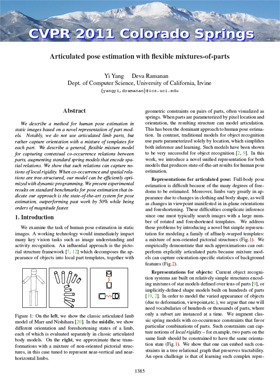Seminar on Current Works in Computer Vision
Prof. Thomas BroxComputer Vision is a very active research field with many practical applications, for instance in quality control, robotics, or driving assistance systems. The ultimate goal of Computer Vision is to imitate the great capabilies of the human visual system, allowing the computer not only to record images but also to interpret them. Research is still far from this goal, but significant progress has been made in recent years.
In this seminar we will take a detailed look at the most interesting recent works that have been published at the latest Computer Vision conference (CVPR 2011). You will read a number of research papers published at this conference. For each paper there will be one person, who performs a more detailed investigation of the research work and its background and gives a presentation. The presentation is followed by a discussion with all participants about the merits and limitations of the respective paper. You will learn to read and understand contemporary research papers, to give a good oral presentation, to ask questions, and to openly discuss a research problem.
|

|
Slides of first session with instructions for a good presentation
Papers:
| Date | Topic | Paper | Questions | Presenting student | Slides | Advisor |
| 23.11. | Diffeomorphic Image Registration | Song et al., Murphy et al., | Questions | Sven Wehner | Benjamin Drayer | |
| 30.11. | Human pose from depth images | Shotton et al. | Questions | Jan Mattner | pdf,vid | Phillip Chlap |
| 07.12. | Datasets and benchmarking | Torralba-Efros | Questions | Nikolaus Mayer | Kun Liu | |
| 14.12. | Structure from motion | Crandall et al. | Questions | Nikolas Engelhard | Benjamin Ummenhofer | |
| 21.12. | Video segmentation | Lezama et al. | Questions | Thomas Rinklin | Robert Bensch | |
| 11.01. | Pose and action recognition with poselets | Maji et al. | Questions | Alexander Fix | Dominic Mai | |
| 18.01. | Shape from shading | Barron-Malik | Questions | Andreas Peer | Qing Wang | |
| 25.01. | Segmentation | Jegelka-Bilmes | Questions | Claire Legendre | Thorsten Schmidt | |
| 01.02. | Object learning | Fathi et al. | Questions | Karina Fitriani Fatimah | Margret Keuper | |
| 08.02. | Face recognition | Belhumeur et al. | Questions | Mauricio Munoz | Maja Temerinac-Ott | |
| 15.02. | Articulated part detection | Yang-Ramanan | Questions | Andreas Behr | Naveen Shankar Nagaraja | |


